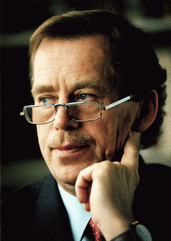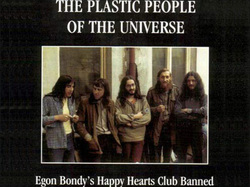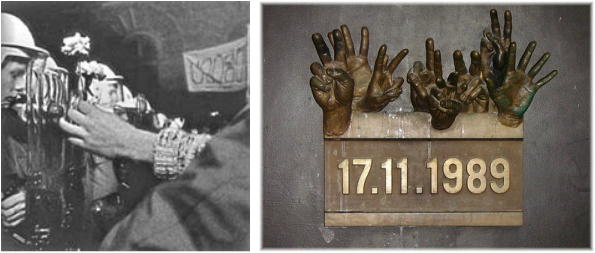|
"Truth and love must prevail over lies and hatred." The motto of a dissident poet and playwright who, when called upon by the people of his country, took up the mantle of politics. Let us remember Vaclav Havel, who died Sunday. He led the 'Velvet Revolution' in 1989 which helped foment the fall of the Iron Curtain and the collapse of the Soviet Union, and later served as the president of Czechoslovakia and the Czech Republic. He endured Communist oppression and imprisonment, but remained an optimist and a force for the dignity of mankind.  Vaclav Havel, 1936 - 2011 "None of us—as an individual—can save the world as a whole, but . . . each of us must behave as though it were in his power to do so," Havel wrote in his 1997 book, The Art of the Impossible: Politics as Morality in Practice. He was born Oct. 5, 1936, into a family of entrepreneurs in Prague. His early life was privileged, but his family's prosperity made it a target after the Communists seized power in 1948. Due to his "bourgeois" origins, Havel was denied a secondary education and had to finish his diploma at night school while working days. He was also denied entry to the history and philosophy departments of Prague's prestigious Charles University. He wound up studying economics at a technical institute instead. These frustrations became a source of creativity,. He mocked the Communist system's bureaucracy in his absurdist plays, which include "Beggar's Opera," "The Garden Party," "Largo Desolato," and "The Memorandum." After the 1968 invasion of Czechoslovakia crushed the "Prague Spring" reform movement, Havel became convinced of the importance of moral resistance to dictatorship. As a prominent pro-democracy leader and critic of the Soviet regime, he was charged with undermining the state. His plays were banned and it was forbidden even to publish his photograph.  In 1977, after members of a punk band called the Plastic People of the Universe were arrested on charges of "disturbing the peace," Havel organized the signing of Charter 77 by writers, actors and public intellectuals demanding basic human and civic rights. That move revived of dissident activity after nearly a decade of repression so severe that almost no opposition had been visible. This era was later commemorated in Tom Stoppard's play Rock n'Roll. In early 1989, Havel was jailed again for several months, but by November it was clear that the Communist regime was doomed. Student demonstrations were on the rise and Havel's Civic Forum organized additional huge protests and held talks with the crumbling Communist government, eventually persuading it to relinquish power.
0 Comments
Leave a Reply. |
AuthorTo find out more about me, click on the Not Your Average Jo tab. Archives
February 2024
Categories
All
|

 RSS Feed
RSS Feed